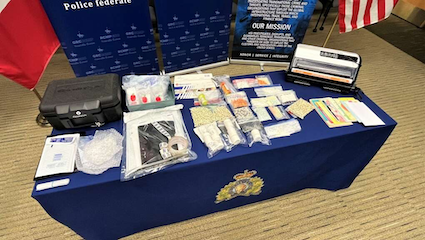A 37-year-old man from Halifax, Canada, has been apprehended and charged with distributing drugs as a dark web vendor. The man sold hundreds of thousands of dollars worth of Amphetamine, Dexedrine, Ketamine, MDMA, Xanax and hydromorphone to various customers in Canada and the United States. This is the first case of its kind in Nova Scotia.
Operation Hackstone: Nova Scotia’s DarkNet Den
37-year-old John Nicholas Allen-Simec was arrested on August 30 for allegedly advertising the illegal sale of opioids on darknet websites. Allen-Simec, based in Halifax, sent packages that contained drugs through the mail. At this point there is no information on which Darknet Market Allen-Simec used or his vendor name.
He has since appeared in provincial court on Monday, November 6, on 14 charges under the Controlled Drugs and Substances Act. The Nova Scotia RCMP confirmed in a statement that the individual was an international drug trafficker who was using the dark web to traffick drugs across Canada and the United States.
His drug trafficking network expanded across the United States and Canada. Allen-Simec would receive cryptocurrency in payment for opioids sold on the dark web. In recent times, drug traffickers have turned to the dark web in an attempt to remain hidden from law enforcement agents.
The dark web is a part of the hidden internet that allows computer networks to communicate anonymously with each other. Accessing the darknet is only possible through the use of Tor Browser.
Following Allen-Simec’s arrest on August 30, he was later released from custody. On Monday, November 6, his lawyer, Allan MacDonald, appeared in a Halifax courtroom on his behalf. Allen-Simec was not present at the trial.
What We Know About The Investigation

In February this year, Royal Canadian Mountain Police were alerted by Homeland Security Investigations of a Nova Scotia-based drug trafficker who was exporting opioid drugs to the United States and domestically exporting the drugs throughout Canada.
Operation Hackstone began in February of this year after RCMP received information from Homeland Security Investigations regarding a Nova Scotia-based drug trafficker who was exporting opioid drugs to the United States and trafficking domestically throughout Canada.
During the investigation, several investigative techniques were utilized to obtain information. These tactics included obtaining judicial authorizations, physical surveillance, and an undercover operation.
“The suspect was advertising the sale of illegal opioids through online darknet websites and receiving payment by way of cryptocurrency,”
Police said in a statement. To uncover the drug trafficking operation, law enforcement officers received assistance from RCMP divisions in Quebec, Ontario, and the National RCMP Cybercrime Investigative Team.
Investigators eventually determined the suspect was based in Halifax and that he was sending packages that contained drugs through the mail. Law enforcement officers intercepted several packages in Canada and the United States.
Once law enforcement agents gathered substantial evidence, investigators executed search warrants in various locations across the Halifax Regional Municipality. Officers seized several items including a 2021 Toyota Rav 4, Hydromorphone, Dexedrine, Ketamine, MDMA, Xanax, receipts, shipping labels, and electronic devices.

The electronic devices and evidence seized as part of the search warrant were consistent with drug trafficking over the dark web. Police officers uncovered several digital cryptocurrency wallets and data stored on the suspect’s electronic devices.
“Criminal actors are relentless in their attempts to exploit the anonymity of the Dark Web to traffic illicit drugs into our communities. Operation Hackstone is an excellent example of HSI’s close partnership with Nova Scotia RCMP and the results that can be accomplished through international unified efforts.”
Magdalena Sigur, Homeland Security Investigations Attaché
The amount and type of cryptocurrency held in the suspect’s digital cryptocurrency wallet remain disclosed. Criminals operate their illicit activities on the dark web in exchange for cryptocurrency.
The decentralized nature of cryptocurrencies makes it harder for law enforcement agents to trace illicit funds. Bitcoin and Monero are two of the most traded cryptocurrencies on the dark web.
Monero has come under the spotlight in recent weeks. Dark web criminals have begun to switch to Monero instead of Bitcoin. The privacy-focused coin is of particular interest for its ability to make anonymous transactions.
Charges and Arrest
On August 30, Nova Scotia RCMP FSOC arrested John Nicholas Allen-Simec for offenses relating to the trafficking of drugs nationally across Canada and for the exportation of drugs to the United States.
Allen-Simec was charged with 14 accounts under the Controlled Drugs and Substances Act. His charges are:
- Trafficking a controlled substance – hydromorphone (three counts)
- Trafficking a controlled substance – amphetamine
- Exporting a controlled substance from Canada – hydromorphone (five counts)
- Exporting a controlled substance from Canada – amphetamine
- Possession of a controlled substance for the purpose of trafficking (two counts)
- Possession of a controlled substance for the purpose of exporting (two counts)
Superintendent Jason Popik, Federal Policing Criminal Operations Officer with the Nova Scotia RCMP, said in a statement,
“International organized crime is taking on more and more forms due to its nimbleness and ability to exploit new technology. In cooperation with the Five Eyes Law Enforcement Group (Canada, U.K., New Zealand, Australia, and the U.S.A.) the RCMP Federal Police are developing countermeasures that enable the RCMP to address the cyber threats and exploitative efforts of these types of criminals, who prey upon emerging and existing vulnerabilities.”
Superintendent Jason Popik

Hey there, I’m a dark web geek who’s been around for the last 8 years. More precisely, I’m livedarknet’s senior content writer who’s been writing about darknet marketplaces, tutorials, and cybersecurity stuff for educational purposes.

